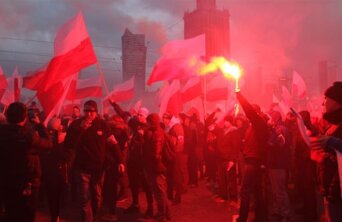- About
- Topics
- Story
- Magazine
- In-Depth
- Picks
- Opinion
- News
- Donate
- Signup for our newsletterOur Editors' Best PicksSend
Read, Debate: Engage.
| editor: | Gurmeet Singh |
|---|
A 'debate' that rages in my home country of the UK every November is about little bits of red card. I'm not making it up – these bits of card are shaped into stylised poppies, which are pinned to lapels. The poppies are inspired by a poem, In Flanders Fields, which, broadly, commemorates the dead of the First World War. The 'debate' at home isn't a debate per se, more an argument – a national shouting match, about them and us. We are people who have lost loved ones in the war, have a stake in Western civilisation, and are proud to show our remembrance. They are the 'snobbish elite' or the 'dirty immigrants' who don't know the first thing about showing respect.
The tenor of the conversation is painful, even threatening, as people's failure to wear the poppy is often taken as a sign of treachery, and an invitation for violence. Daily newspapers call for people's heads if they choose not to wear a poppy. Internet boards are predictably ablaze, and it's normally the UK's Muslims who bear the brunt of it.
Respect for the dead should be shown; I don't think anyone is arguing against the very principle of remembrance. However, the idea that respect could be weaponised against minorities, and also people who disagree with the very notion of wearing poppies (for whatever reason, for example, some poppy charity proceeds are actually put to the funding of current British war efforts, making pacifism a legitimate ground to refuse to wear one), is unseemly, and unbefitting the very thing the poppy seeks to symbolise: life lost in defence of freedom.
Coincidentally, Poland's day of independence falls on November 11th (not for the same reasons as the British Remembrance day), and the way the event was marked this year was astonishing. 60,000 people marched through Warsaw; it was organised by nationalist organisers, and many parts of the crowd chanted some very colourful things, including:
"The whole Poland sings with us: f*** off with the refugees", "God, honour, homeland", "Not red, not rainbow but national Poland", "One nation across the borders" and "F*** Antifa".
Al-Jazzera reports that amid the sea of banners, messages included: "Clean Blood", "Europe Will Be White" and "Pray for Islamic Holocaust."
"The media is filled with right-wing propaganda; the discourse has shifted towards views which only a few years back would have been unequivocally labelled as fascist and racist," said an anti-fascist protestor who was part of a small counter-demonstration.
So history, God and national days of commemoration become the tools for the far-right, once more. Once more we see little bits of card and people walking through the street as a sign that the world is becoming more divisive and angry than we had hoped it would.
But we must rise to the challenge. Here's some information about to do that, from America's SPLC: https://www.splcenter.org/20170814/ten-ways-fight-hate-community-response-guide
Credit for image: Agnieszka Pikulicka-Wilczewska/Al Jazeera
